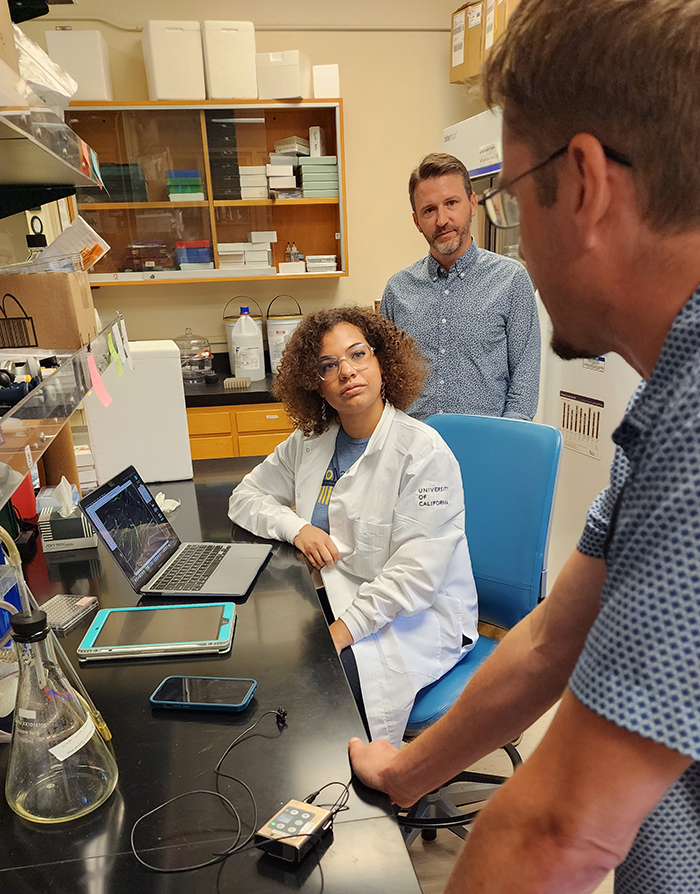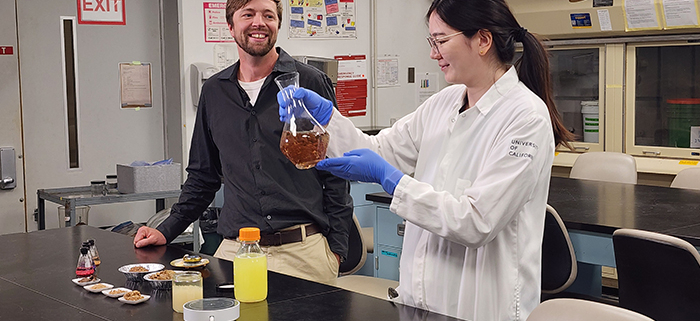UC Davis Awarded $3M Grant to Develop Industrial Biotechnology Training Program
By Albert Liu
The National Science Foundation is awarding the University of California, Davis, $3 million to create a new research traineeship program focusing on industrial biotechnology. The five-year grant will fund the development of the Bioindustrial Engineering for a Sustainable Tomorrow (BEST) program and create a curriculum for graduate students to acquire new technical and professional skills, preparing them for the rapidly expanding U.S. biotechnology market.
Facing a growing population and a changing climate, humanity will need to create innovative solutions and train highly skilled individuals to enact them. In response to these challenges, President Joe Biden issued an Executive Order in the fall of 2022 directing the advancement of biotechnology and biomanufacturing. By harnessing the principles of biology to manufacture food, pharmaceuticals, chemicals, and more, the activities outlined in this Executive Order aim to improve the American economy, environment and quality of life. To this end, the National Science Foundation (NSF) has selected the UC Davis BEST program for funding as part of the NSF Research Traineeship Program to address these directives and train a future biotechnology workforce.
The UC Davis Biotechnology Program is working closely with principal investigator Juliana de Moura-Bell to spearhead the BEST program. The leadership team includes Denneal Jamison-McClung, director of the Biotechnology Program, David Block, director of the Integrative Center for Alternative Meat and Protein, Anna Denicol, Somen Nandi and several other UC Davis faculty members with a range of research expertise, including industrial bioengineering and precision fermentation, food science, plant science and related fields. On forming this campus-wide collaboration, De Moura Bell said, “Tackling complex problems like this will require a wide range of expertise that you can only get by bringing people from different research areas together.”
The BEST program will start at the graduate student level and continue through entry into the workforce, with the goal of creating a community of industrial biotechnology practitioners. Master’s and doctoral students will select from one of three focus areas: Cultivated Meat, Alternative Proteins for Human and Animal Nutrition, and Natural or Recombinant Plant/Algal Proteins and Small Molecules for Industrial Applications. Trainees will acquire new skills in their focus area through guided coursework and workshops, in addition to participating in experiential opportunities such as internships and outreach to prepare them for a future career.

Graduate student researcher Madison Stewart in Professor Lucas Smith’s lab.
UC Davis has a historical commitment to enhancing graduate learning in biotechnology, with the Biotechnology Program serving as the home to several successful interdisciplinary training programs since the 1990s. The BEST team will build on this foundational expertise and continue longstanding work to broaden participation in STEM fields by engaging students from underrepresented and underserved communities. “Our goal is to develop a community of diverse, technically excellent graduate trainees who understand translational research and can communicate their science to non-specialist audiences,” said Jamison-McClung.
Along with technical expertise in bio-industrial engineering, the BEST leadership team has expertise in building inclusive research and training teams – de Moura-Bell has been recognized as a Center for the Advancement of Multicultural Perspectives on Science (CAMPOS) faculty scholar and Jamison-McClung serves as a CAMPOS affiliate, highlighting the investment by BEST leadership in creating an inclusive and diverse environment to help students to succeed.
At the institutional level, UC Davis serves as a governing member of BioMADE, a national institute focused on enabling American biomanufacturing. The BEST program will share BioMADE’s commitment to their 4S Social Dimensions: Safety, Security, Sustainability, and Social Responsibility. BEST trainees’ required coursework will include modules on bioethics and professionalism, science communication, team science, and project management, ensuring that technical advances serve the interests of society. Additionally, UC Davis is home to the Cultivated Meat Consortium and the Integrative Center for Alternative Meat and Protein (iCAMP), which are conducting complementary activities to the planned BEST curriculum in similar research spaces. With increasing investment in biotechnology in the greater Yolo, Solano, and Sacramento County areas, UC Davis will be uniquely poised to train graduate students to lead and staff a rapidly growing industry in our region.
As the BEST program prepares for launch, de Moura-Bell shared her vision for their future direction: “The ultimate goal is to become part of UC Davis, to continue to offer holistic training, and to benefit many more people to come.”
Feature image caption: Graduate students researchers Cody Yothers and Lin Cao conducting research at the lab.







